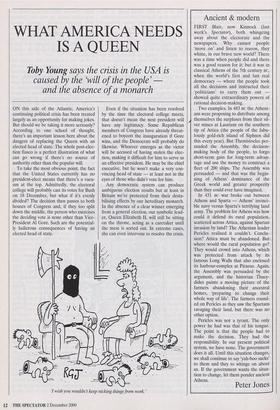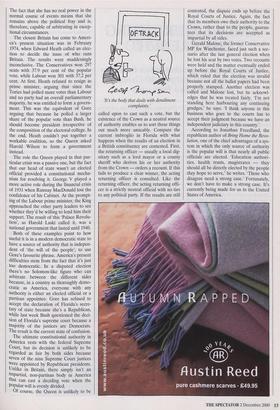WHAT AMERICA NEEDS IS A QUEEN
Toby Young says the crisis in the USA is
caused by the 'will of the people' and the absence of a monarch
ON this side of the Atlantic, America's continuing political crisis has been treated largely as an opportunity for making jokes. But should we be taking it more seriously? According to one school of thought, there's an important lesson here about the dangers of replacing the Queen with an elected head of state. The whole post-elec- tion fiasco is a perfect illustration of what can go wrong if there's no source of authority other than the popular will.
To take the most obvious point, the fact that the United States currently has no president-elect means that there's a vacu- um at the top. Admittedly, the electoral college will probably cast its votes for Bush on 18 December, but what if it's evenly divided? The decision then passes to both houses of Congress and, if they too split down the middle, the person who exercises the deciding vote is none other than Vice- President Al Gore. Such are the potential- ly ludicrous consequences of having an elected head of state. Even if the situation has been resolved by the time the electoral college meets, that doesn't mean the next president will have any legitimacy. Some Republican members of Congress have already threat- ened to boycott the inauguration if Gore wins, and the Democrats will probably do likewise. Whoever emerges as the victor will be accused of having stolen the elec- tion, making it difficult for him to serve as an effective president. He may be the chief executive, but he won't make a very con- vincing head of state — at least not in the eyes of those who didn't vote for him.
Any democratic system can produce ambiguous election results but at least in Britain we're protected from their desta- bilising effects by our hereditary monarch. In the absence of a clear winner emerging from a general election, our symbolic lead- er, Queen Elizabeth II, will still be sitting on the throne, acting as a caretaker until the mess is sorted out. In extreme cases, she can even intervene to resolve the crisis. The fact that she has no real power in the normal course of events means that she remains above the political fray and is, therefore, capable of arbitrating in excep- tional circumstances.
The closest Britain has come to Ameri- ca's present situation was in February 1974, when Edward Heath called an elec- tion to decide the issue of who runs Britain. The results were maddeningly inconclusive. The Conservatives won 297 seats with 37.9 per cent of the popular vote, while Labour won 301 with 37.2 per cent. At first, Heath refused to resign as prime minister, arguing that since the Tories had polled more votes than Labour and no party had an overall parliamentary majority, he was entitled to form a govern- ment. This was the equivalent of Gore arguing that because he polled a larger share of the popular vote than Bush, he should become president irrespective of the composition of the electoral college. In the end, Heath couldn't put together a workable coalition, so the Queen asked Harold Wilson to form a government instead.
The role the Queen played in that par- ticular crisis was a passive one, but the fact that our head of state wasn't an elected official provided a constitutional mecha- nism for resolving it. George V played a more active role during the financial crisis of 1931 when Ramsay MacDonald lost the confidence of his Cabinet. At the prompt- ing of the Labour prime minister, the King approached the other party leaders to see whether they'd be willing to lend him their Support. The result of this 'Palace Revolu- tion', as Harold Laski called it, was a national government that lasted until 1940.
Both of these examples point to how useful it is in a modern democratic state to have a source of authority that is indepen- dent of 'the will of the people', to use Gore's favourite phrase. America's present difficulties stem from the fact that it's just too democratic. In a disputed election there's no Solomon-like figure who can arbitrate between the different sides because, in a country as thoroughly demo- cratic as America, everyone with any authority is either an elected official or a Partisan appointee. Gore has refused to accept the declaration of Florida's secre- tary of state because she's a Republican, While last week Bush questioned the deci- sion of Florida's supreme court because a majority of the justices are Democrats. The result is the current state of confusion.
The ultimate constitutional authority in America rests with the federal Supreme Court, but its decision is unlikely to be regarded as fair by both sides because seven of the nine Supreme Court justices were appointed by Republican presidents. Unlike in Britain, there simply isn't an impartial, non-partisan body in America that can cast a deciding vote when the Popular will is evenly divided. Of course, the Queen is unlikely to be called upon to cast such a vote, but the existence of the Crown as a neutral source of authority enables us to sort these things out much more amicably. Compare the current imbroglio in Florida with what happens when the results of an election in a British constituency are contested. First, the returning officer — usually a local dig- nitary such as a lord mayor or a county sheriff who derives his or her authority from the Crown — orders a recount. If this fails to produce a clear winner, the acting returning officer is consulted. Like the returning officer, the acting returning offi- cer is a strictly neutral official with no ties to any political party. If the results are still contested, the dispute ends up before the Royal Courts of Justice. Again, the fact that its members owe their authority to the Crown, rather than to the people, guaran- tees that its decisions are accepted as impartial by all sides.
Gerald Malone, the former Conservative MP for Winchester, faced just such a sce- nario after the last general election when he lost his seat by two votes. Two recounts were held and the matter eventually ended up before the Royal Courts of Justice, which ruled that the election was invalid because not all the ballot papers had been properly stamped. Another election was called and Malone lost, but he acknowl- edges that he was treated fairly. 'I'm not standing here harbouring any continuing grudges,' he says. 'I think anyone in this business who goes to the courts has to accept their judgment because we have an independent judiciary in this country.'
According to Jonathan Freedland, the republican author of Bring Home the Revo- lution, one of the chief advantages of a sys- tem in which the only source of authority is the popular will is that nearly all public officials are elected. 'Education authori- ties, health trusts, magistrates — they should all be directly elected by the people they hope to serve,' he writes. 'Those who disagree need a strong case.' Fortunately, we don't have to make a strong case. It's currently being made for us in the United States of America.



















































































 Previous page
Previous page